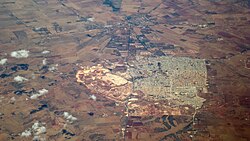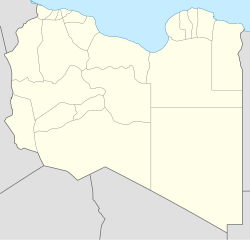Al Marj
|
Marj المرج El Merj |
|
|---|---|
| City | |

Old (above) and new city (below)
|
|
| Location in Libya | |
| Coordinates: 32°29′12″N 20°50′02″E / 32.48667°N 20.83389°ECoordinates: 32°29′12″N 20°50′02″E / 32.48667°N 20.83389°E | |
| Libya |
|
| Region | Cyrenaica |
| District | Marj |
| Elevation | 333 m (1,093 ft) |
| Population (2004) | |
| • Total | 85,315 |
| Time zone | EET (UTC+2) |
Marj /ˈmɑːrdʒ/ (Arabic: المرج Al Marǧ, English: The Meadows), also spelt El Merj, generally believed to be on the site of the ancient city of Barca or Barce, is a city in northeastern Libya and the administrative seat of the Marj District. It lies in an upland valley separated from the Mediterranean Sea by a range of hills, part of the Jebel Akhdar Mountains.
It has an estimated population of 85,315 (As of 2004[update]). There are a couple of banks on the main street and the main post office is in the city centre, not far from the Abu Bakr Assiddiq mosque.
According to most archeologists, Marj marks the site of the ancient city of Barca, which, however, according to Alexander Graham, was at Tolmeita (Ptolemais).
Marj grew around a Turkish fort built in 1842 and now restored. During the colonial dominance of Libya (1913–41), the town was called Barce and was developed as an administrative and market centre and hill resort.
During the World War II North African campaign, the 1st Field Regiment, Royal Australian Artillery won a battle for the region of Barce on 5 February 1941. The regiment commemorates this battle by naming the facilities at its base at Enoggera as Barce Lines.
...
Wikipedia

